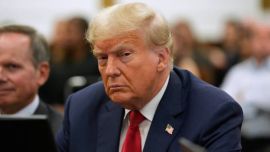In an election that is drowning in uncertainty, the killing of an 11-year-old girl who was on her way to school when she was attacked by petty thieves has forced the whole political ecosystem to hit the brakes and reassess what’s at stake. As the political discussion centred on who would take the primary in Juntos por el Cambio, whether Unión por la Patria would be competitive, and how many votes the far-right ultra-libertarians would get, a cold shower has forced everyone to wake up and acknowledge the deep socio-economic problems the country is immersed in, starting with the troubling levels of poverty and lawlessness that defines the Conurbano or urban-ring of municipalities skirting the more affluent neighbourhoods that make up the Buenos Aires Metropolitan region (AMBA).
Ultimately, the rise of structural poverty and associated violence and drug-trafficking is everyone’s problem given the unitary nature of the country and the size of the Conurbano, which together with AMBA represents nearly 40 percent of the Argentine population. Morena Domínguez’s death occurred after she was assaulted while defending her cell phone from “motochorros” or “motorbike thieves” who flood Greater Buenos Aires on their rundown scooters pillaging mainly their neighbours, in this case in the municipality of Lanús. They are part of a degraded urban landscape where the poor feed off the poor, public services are few and far between and criminality has become the norm. It happened in a district where Patricia Bullrich’s candidate for Buenos Aires Province governor Néstor Grindetti is on leave as mayor and in the region where Peronist Governor Axel Kicillof is seeking re-election, a neighbourhood named Villa Diamante that sits on the border with Buenos Aires City. That what happens in the Conurbano impacts the whole country explains why every major candidate for the Presidency decided to cancel or tone down their end-of-campaign rally.
Dubbed, “a black swan in this campaign season that has paralysed candidates on both sides” by Ariel Maciel in Perfil, the harrowing nature of the crime, the fact that it was caught on security cameras and broadcasted nationally almost in real time, and its proximity to the PASO primaries could have a lasting impact on the political field by modifying the expected outcome of the election. For this to happen, Morena’s death would have to drag the focus of the campaign from political infighting and the economic debate to one of insecurity and poverty. Would this benefit Bullrich, seen as a hardliner in her primary battle with coalition rival Horacio Rodríguz Larreta, and libertarian lawmakerJavier Milei? Could it lead to a further disillusionment with the political class that further lowers the turnout?
The iterations of these counterfactual scenarios could be endless. Yet, beyond Morena’s murder and its potential impact on the primaries, the issue of potential black swan events can be put on the table and analysed. At a recent private conversation with one of Argentina’s most revered political strategists with top businessmen, the question of potential surprises was raised. The expert mentioned three: that Milei could have a much stronger election than expected, that Grabois also looked solid, and that all three main political spaces remained competitive going into the general elections.
A good electoral showing for the ruling coalition, Unión por la Patria, now led by Sergio Massa, a relatively unpopular politician not directly associated with Cristina Fernández de Kirchner, seems intuitively unlikely. Yet that’s what opinion polls suggested up until last week when the electoral ban on publishing surveys came into effect. Can Unión por la Patria really head into the general election looking competitive with Massa, the economy minister who’s seen inflation spiral into triple digits as the peso-dollar exchange rate appears out of control, and Juan Grabois, a left-wing social leader whose plan for Argentina is based on a Soviet-style agrarian redistribution of lands? While logic suggests it is difficult to imagine a solid showing, it feels like even the best result will be absolutely underwhelming under historical standards, forcing the pan-Peronist front to double down on its efforts if it aspires to make it into the run-off.
Another seemingly unexpected scenario would be a Rodríguez Larreta victory in the opposition primaries. This appears counterintuitive in that the mayor of Argentina’s richest city, a bastion of the PRO party and the Juntos por el Cambio coalition – where Rodríguez Larreta remained incredibly popular over his past eight years in office and previously as Mauricio Macri’s Cabinet chief – appeared like the obvious victor only a year ago. That Patricia Bullrich has become a serious contender, and toward the end of the race the front-runner, was unfathomable not too long ago, when it seemed like society was looking for a centrist moderate to end decades of polarisation (“la grieta”). Yet Bullrich hardened her stance in the heat of a mentor vs. protégé battle for supremacy, aligning herself with Macri and moving closer to Milei. Toward the end of last week the figures suggested Rodríguez Larreta was inching closer, but on average he appeared well outside of the confidence intervals, yet for some reason there’s still a feeling that he’ll pull a rabbit out of the hat.
The third question-mark has to do with Milei, the rockstar economist who went from talking head to potential presidential contender. He grew as time went by, consolidating his candidacy by attracting a large group of potentially angry voters who are tired of the status quo. The outspoken lawmaker’s eccentricity and mannerisms turned him from laughing-stock to mad genius in the eyes of his electorate, appearing passionate and decisive, even if most of his supporters don’t understand Austrian economic theory. At one point Milei was on track to become the single most-voted-for candidate in the PASO primaries. When he was the centre of attention, Milei also attracted political attacks from his rivals, with his mistakes blown up for everyone to see. He’s been accused of selling candidacies on his legislative lists and franchising his brand for regional elections. The deputy’s plan to dollarise the economy was repudiated by both major coalitions. And his stature in polls began to slide. According to Perfil’s Gustavo González, Milei’s potential voting intention in surveys went up and then down before the cut-off. Not only is there a question about whether his followers will turn up to vote, and then effectively vote for him, but also where he counts with the territorial capacity to ensure his ballots are actually there all over the country, and that his votes are actually counted. The intricacies of the Argentine system.





















Comments